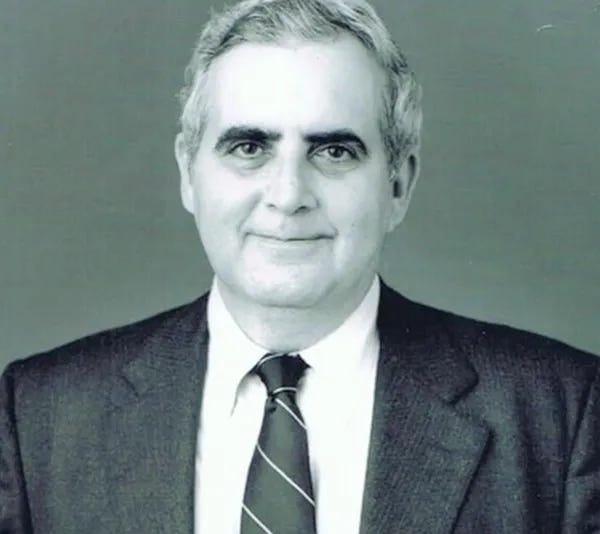One of the important figures of the last half-century of Washington politics and journalism, Charlie Peters, died on Thanksgiving at age 96. He was my first boss in writing—my editor, mentor, teacher, and friend.
He died a peaceful natural death at the conclusion of a long, accomplished life. Thus, there is no reason to be sad—we should all hope our lives end as well as his!
If an afterlife awaits, today, Charlie is in paradise. If there is no afterlife, then the end was always inevitable, no matter what anyone did. Nothing is gained by raging against death.
When my turn comes, remind me I said this.
Peters, from West Virginia, was self-made in politics (he managed John Kennedy’s pivotal 1960 primary campaign) and then journalism (founding the innovative Washington Monthly).
Many rich people have started magazines and failed. Few of average means started a magazine and succeeded. Charlie did. Washington Monthly has been in continuous publication, if on a shoestring, for 54 years, as far better-funded publications fell by the wayside.
Donate now to the Washington Monthly.
Charlie’s founding insight was that much of Washington news is self-serving make-believe. Today everyone believes that: when Charlie began saying it, this was heresy. He further said, back when liberalism thought “private enterprise” was a swear phrase, that government should set the goals but market forces should make the choices about how to realize them.
His approach to journalism was so widely embraced that today the New York Times, Washington Post, and other mainstream news organizations basically are trying to be the Washington Monthly of about 1980. And Charlie had no journalism training. He’d gone to law school.
Peters also loved the United States and argued against the fashionable anti-Americanism of the Ivy League and Manhattan media. Sadly, he got no purchase at all with this.
A full appreciation of Charlie is here, from James Fallows, the writer who knew him best.
You will read a lot about Charlie’s influence on journalism and political thought, where he punched far above his weight.
You might hear about his unorthodox business strategies, such as “paying” a bill by deliberately sending an unsigned check. The vendor had to mail the check back for signature. That bought Charlie another month to seek investors.
His impact on literary writing was as important as his impact on journalism and politics. When the history of this period is written, Peters will be ranked as equal in importance to the literary editors Harold Ross, William Whitworth, Philip Rahv, Arnold Gingrich, and William Shawn.
Before Peters, literary nonfiction was too ivory-tower. Charlie insisted that every article enfold The Big Three—reporting, thinking, and writing. Serious nonfiction had been open to reporting during the time of Ida Tarbell and Elizabeth Cochran (“Nellie Bly”), but by the postwar period, doing legwork and interviews were looked down on.
Charlie was insistent his writers get out of Washington D.C., see things for themselves and interview the midlevel government and business officials who knew what was really going on. It was a formula for scoop after scoop—both news scoops and intellectual breakthroughs.
And though he relentlessly mocked snobs, Charlie had a nose for elegant writing, discovering Fallows, Nicholas Lemann, Taylor Branch, Suzannah Lessard, Jon Alter, Michelle Cottle, David Ignatius, Kate Boo, Timothy Noah, Paul Glastris, Matt Cooper, Jason DeParle, Mickey Kaus, Jon Meacham, James Bennet, Joe Nocera, Walter Shapiro, Haley Edwards, Nick Thompson, Josh Green, Amy Sullivan and numerous others. Me too! Charlie taught all of us that style need not be boring.
Donate now to the Washington Monthly.
Washington Monthly alumni have produced as many books of significance as, during the same period, alumni of the New York Times, which is a thousandfold larger and a millionfold better funded.
Follows are my two favorite Charlie anecdotes:
First. I was a young man in Chicago working for a trade magazine about toxic waste. The very best trade magazine about toxic waste! And a diehard Washington Monthly reader.
I wrote an article for Charlie freelance and it made the cover. I knew Peters had a track record of gambling on unknowns. I called him up and told him that if he’d hire me—Washington Monthly editor’s jobs paid $33,000 a year in today’s dollars—I would give up my glamorous toxic waste lifestyle and work for him.
Charlie said, “I don’t have the budget to pay your moving expenses. If you lived in Washington, I’d hire you in a heartbeat.”
So I quit my job, put my possessions into a U-Haul that towed my used Toyota, drove to Washington, found a Hill staffer looking for a roommate, and a few days later sat myself on the Monthly’s office steps waiting for Charlie to come into work.
“I’m here,” I said.
In what would become 40 years of knowing him, it was the only time I ever saw Charlie speechless.
Donate now to the Washington Monthly.
Second, after I had been a Washington Monthly editor for a few months, he invited me to lunch, a ritual for new staff. We went to one of his favorite haunts, a Middle Eastern place off Dupont Circle. The host knew him and didn’t need to take his order, but asked what drink he should bring to the table. “Two dry gin martinis, a half carafe of rose and a Heineken,” Charlie said. Then turned to me and asked, “And would you like something to drink?”
My life would not have been the same without Charles Peters, nor the lives of dozens of writers, nor the lives of thousands, if not millions, of readers who benefited from what he taught.
In Psalms, we read, “The upright shall behold the face of God.” I wonder if the Maker will be able to win arguments with Charlie.
This article originally appeared in All Predictions Wrong, the Substack from Gregg Easterbrook.



